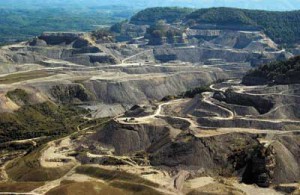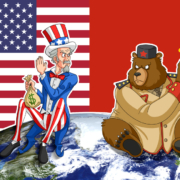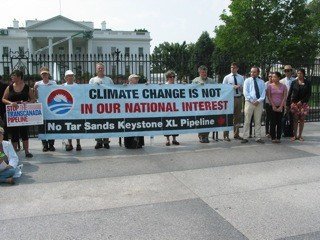The Role of Regulation in a Steady State Economy
by Brent Blackwelder
 Regulations have played an essential role in modern attempts to curtail pollution, prevent abuses in the banking system, ensure safe food, and protect public health. They have been indispensable in checking powerful corporate interests that abuse the public trust.
Regulations have played an essential role in modern attempts to curtail pollution, prevent abuses in the banking system, ensure safe food, and protect public health. They have been indispensable in checking powerful corporate interests that abuse the public trust.
Now, just on the heels of the global financial collapse and forty years after the first Earth Day, we are witnessing two frustrating failures in the United States:
(1) the failure of regulatory bodies to perform their duties, and
(2) the failure of regulations to achieve objectives contained in major laws (e.g., the coal strip mining law (SMCRA), the Clean Air Act and the Clean Water Act).
A prime example is the inability and the unwillingness of the government to implement the law and halt the obliteration of portions of the Appalachian Mountains by mountaintop-removal mining. Despite creative strategies by many citizen groups involving all branches of government — legislative, executive, and judicial — the erasure of the landscape continues. The destruction of these biologically diverse mountains in West Virginia and the wreckage of public drinking water, however, are not just environmental nightmares. They are also economic calamities that are completely incongruent with the principles of a steady state economy. A corporation with a health, safety, and environmental record like Massey Energy would not even be able to maintain a license to do business in a steady state economy.

Better regulation could prevent problems like this nightmare on Kayford Mountain.
Regulations, including tax code changes and outright bans on particularly destructive practices, will be part of the landscape in a steady state economy, but we have to structure them differently. We need to change the dynamics that cripple much regulation today. Here are some key elements of the regulatory transition aimed at curtailing the abuses of corporations and preventing pollution:
(1) Make it vastly more expensive to pollute than to prevent pollution: no more token fines, legal delays, and slaps on the wrist.
(2) Increase taxes on pollution — it’s a no-brainer to tax what we want to reduce or eliminate.
(3) Apply special regulatory attention to the natural resource extracting industries (i.e., fossil fuel, timber, and mining). These industries are causing immense pollution and wiping out entire ecosystems. Extra disincentives should accompany any regulations on pipelines, drilling, reactors and other risky ventures where the consequence of an accident — natural or man-made — produces very damaging health or environmental impacts.
(4) Economize the use of raw natural resources in production processes and establish comprehensive recycling programs. In his seminal book, Cradle to Cradle, architect William McDonough has described such a strategy for reducing the enormous throughput of raw materials to a sustainable level.
Here are two examples to illustrate the above points:
(1) The U.S. strategy for phasing out the use of ozone-depleting chemicals under the Ozone Treaty of 1987 (Montreal Protocol) was a smashing success. It is a strategy worth implementing for other pollutants. The Congress set phase-out dates for a group of ozone-depleting chemicals and imposed a steeply increasing tax on their usage until the date of the ban arrived. In response, corporations stopped using the chemicals ahead of schedule, quite a different scenario from the usual foot-dragging.
(2) Yet another oil spill just occurred, this time on Montana’s magnificent Yellowstone River when an Exxon pipeline ruptured and spilled an estimated 42,000 gallons. In the past year the world has witnessed a major nuclear catastrophe in Japan at the reactors in Fukushima, run by Tokyo Electric (TEPCO), as well as a gigantic oil spill in the Gulf of Mexico when BP’s deep drilling went awry. In these and other similar cases the current global system privatizes the gains and socializes the losses (i.e., the corporations keep the profits, and citizens get stuck with the bill for the environmental disasters). Nobel-prize-winning economist Joseph Stiglitz observes that societies following this policy “inevitably mismanage risk.” With each passing day, it becomes clearer that we need to manage risk, not continue to mismanage it. Thus, regulatory controls on extractive industries must reflect the riskiness and magnitude of adverse outcomes.
In contrast to this discussion on improving regulatory approaches, the present Republican leadership has given a green light to eviscerating regulations across the board, much as former House Speaker Newt Gingrich attempted in the mid 1990s. This is part of a long-term, deliberate effort to frame regulation as being the problem, not the solution.
I suggest that we directly confront this ideology and switch the frame to view new regulatory approaches as problem-solvers that will achieve beneficial results for human civilization and the ecosystems we inhabit.





Brent, thank you for the reminder that regulaton is very necessary, being Australian I am particularly pleased about the imminent introduction of a carbon tax. But I wonder whether this too will be a phyrric victory. Having recently travelled through Asia and particularly Viet Nam and China lack of regulation is more evident than anywhere else in the world, and this will be an incredible problem in the coming years. Daily there were reports in the english speaking press about melamine in milk, colourings to make pork look like beef, preservatives in packaged bread products, lead contamination near battery factories and of course the exploding water melons. What we can see in China is that the pace of economic growth has outstripped the ability of legislation to produce laws, what can you expect when things are moving at 10% a year.
The Montreal Protocol was a landmark piece of legislation which took 20+ years to enact. In the meantime stalling tactics were used which allowed private enterprise to do it’s numbers and come up with a compromise that was suitable to it. Reading the update to “Limits to Growth” a whole section was dedicated to the discussion of it’s success, but was it such a success ? LtG provides some chilling facts that although the major ozone depleting chemicals were banned, lesser ozone depleting chemicals were permitted to allow developing countries to access modernisation. Of course the Jeavons paradox is now invoked whereby the numbers of units using the lesser ozone depleting chemicals maintains the destruction of the ozone layer until 2150. The ozone layer, as I understand it is not forecast to begin recovery until that time. Free market wins again, this time with the consent of the regulators.
It’s taken me many years to swallow the bitter pill of the reality of government regulation. Ove 40 years of environmental activism I’ve finally come to the following conclusions.
Regulations do not stop abuse, pollution, habitat destruction, climate variation.. .what have you. Regulations only regulate pollution etc. NEPA does not stop pollution, it regulates it. The Clean Air Act does not stop air pollution, it allows it to continue… regulated. The California Coast Act does not prevent coastal development… it regulates it.
You get the picture. Corporations will always pollute, develop, destroy habitat. Climate will always be variable. Regulation doesn’t change this, it just puts it in the realm of human notice. Regulation is the bureaucratic excuse for business as usual.
The only way to stop corporate abuse is to rein in corporations, put them on a short leash and dissolve them when they don’t live up to their commitments to their source of charter. Humans create corporations to do good. Humans can uncreate corporations when they fail to do good.
It’s a matter of choice.
All very nice. Of course regulation plays a part but even with this it doesn’t really elucidate what is actually necessary at a very, very fundamental level of thought and planning.
If you aren’t minimally considering and modeling your plans based on this:
http://en.wikipedia.org/wiki/Control_theory
…you absolutely can not assure steady-state or even stability of the regulation over time as you propose.
What folks here are typically implying in the “State State Economics” world (based on reading various blogs like this) is specifically something called “marginally stability” which is not really stable nor capable of true steady-state behavior. This is how wrong and dangerous being imprecise about this subject and how to achieve it can be. Many of the political positions and decisions urged in these forums actually will achieve precisely the opposite result from the intention.
Ignoring this branch of knowledge and its mathematics is precisely using ancient or mediaeval or simply just “toddler-level” thinking and modeling to design and control a complex system. Would you trust a toddler to design and maintain the NASA Space Shuttle? These kinds of “hand-waving” argument are exactly that. Even using graphical supply-demand curves is still exactly that primitive and assured to get it wrong most of the time.
We engineers deal with these concepts of system regulation, stability and steady-state-ness on a daily basis and are trained in mathematical complexities of control theory. Steady-state control is bread-and-butter to any engineer but especially to electrical engineers. Most of the modern miracles in your life involving electricity or electronics directly involves control system theory of this type.
The real world IS governed by these mathematics, not by political or ideological rules. Political ideology generally is based on a presumption that any path aligned with an ideal is equal and equivalent in terms of methods, goals and effects to the real world. Ideology is anti-empiriciam in the limit. This is pure crap. It is 100% EPIC FAIL.
The entire success of technological society and the tools created by engineers using these mathematics is direct empirical evidence of this. It’s not trivial to get control systems right and it is quite easy to accidentally and paradoxically create unstable, non-steady-state systems behaviors with just the slight error in operational logic or design or parameter shift.
The link above is even an approximate for engineers in that it presumes the systems are linear: y = mx + b or y = m (dy/dx) + b type of relationships. For small excursions of the controlling variables this is a reasonable approximation (like in the “hard sciences” of physics and things derived from physics in engineering).
Real natural and human social systems, especially economics systems, are absolutely not linear equations or linear differential equations; they are nonlinear. Creating control systems for those is far, far more challenging and far, far more prone to instability and lack of steady-state control. Yet for a small-excursion even a nonlinear system _must at least be linearly stable and steady-state_ as table stakes. This is why linear models are still valuable – as long as you know when they lie to you which they will eventually.
And the recent economic crash is evidence of how even that linear approximation can fail: most economic models are no better than linear and usually far worse than linear (many don’t even operate on 1+1=2 arithmetic certainty or rules – many that presume exponential growth are more like 1+1=5 at their most fundamental assumptions).
Nonlinear models at least can predict things like the recent crash are possible and sometimes can even give broad conditional rules of when a state change is likely. This in contrast to typical linear economic models that would and often do stoutly claim and demand such things can not possibly occur; that things are “under control”. Does this sound like the befuddlement about the crash by so many “top shelf” economists in 2008? It should. It’s part of the reason why they were “lost”. Their models are generally non-empirical, hopelessly primitive and non-mathematical in a very basic sense.
One little unescapable fact of control system theory: it’s impossible to attain stead-state control with arbitrary precision. Simply can’t happen. And even trying comes with considerable and significant costs in terms of energy and resources. Arguing “you can” is literally arguing against the laws of physics akin to saying “The law of gravity is inconvenient; I hereby legislate a repeal of it here in my country”. Good luck with that and tells us when it fails. This reality needs to engrained fundamentally into any non-technical discussion of this subject.
Related to this is the very common political regulatory policy is “zero tolerance”. “Zero tolerance” for any regulation system can trivially be shown to be mathematically equivalent to an “Open Loop” completely non-regulating system if you ever even manage to approach that “zero tolerance” goal.
In which case what you imagined you had “completely under control” is in fact “maximally out of control” and subject to radical change of state at the smallest perturbation. Again, this should remind you of the recent economic crash. This is exactly why you can’t control anything to an arbitrary level of control – error aka “undesireable outcomes” are required to be tolerated to have any control at all.
You must have some traffic deaths on the highways to control the number of traffic deaths. You must have some infants drowning in buckets of water to control how many infants drown in buckets of water. This is why you can’t push a business’ cost to zero for maximum profit.
You must have an overhead cost of undesirable events to control anything. This because you can’t control what you can not measure and thus can not generate an error signal for.
In the resource context, you must have resource “wastage” to use and control resources for any purpose. The only “zero cost” solution to this is to keep everything in the ground and on the trees and simply pack up and die instead – zero consumption also. In other words – the 2nd law of thermodynamics applies to societies, economic systems and political systems at a fundamental level.
And in the context of thermodynamics and energy/resource extraction costs, this means everything WILL grind to a halt long before you actually run out of energy or minerals.